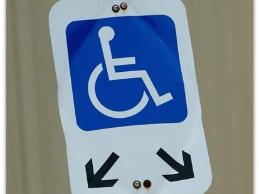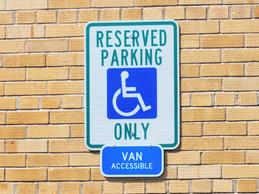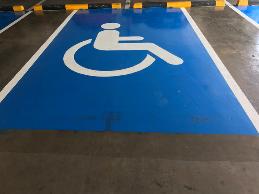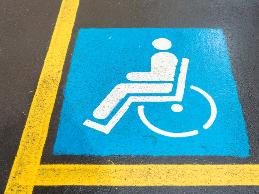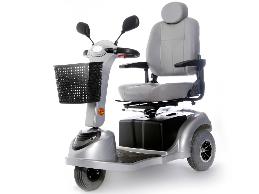On This Page
Introduction
Parking is a benefit of employment that some employers provide to employees. It is clear that under the Americans with Disabilities Act (ADA) employers must provide reasonable accommodations so employees with disabilities can have access to benefits of employment such as parking. What is not clear is how far employers have to go when providing parking-related accommodations. The following discusses some of the issues that can arise when an employee with a disability asks for an accommodation for parking:
Does an employer have to provide parking for an employee with a disability as an accommodation under the ADA when it does not provide parking for other employees?
In an informal guidance letter, the EEOC states: Accessible, reserved parking may be a form of reasonable accommodation. Generally, this means that if an employer provides parking spaces to all personnel, then an accessible space must be provided to an employee with a disability, unless it would pose an undue hardship. But if an employer does not provide employee parking, then the employer would not have to provide parking as an accommodation.
Of course there is a complication. In the same guidance letter, the EEOC went on to state that a decision by the Second Circuit Court of Appeals may make it possible to argue that an employer must provide parking that meets the needs of an individual with a disability, even if parking is not provided to other employees. In the decision, the Court suggested that the fact that other employees did not receive paid parking might be irrelevant to whether an employee with a disability could receive such parking.
So, in the Second Circuit at least, which includes New York, Vermont, and Connecticut, employers may have to provide parking-related accommodations, even if they do not provide employee parking for other employees.
For additional guidance on this issue, view the Equal Employment Opportunity Commission's January 9, 1997, "Guidance Letter."
If the employee parking lot meets the specifications of the ADA Accessibility Guidelines, is that sufficient?
According to the EEOC in its Title I Technical Assistance Manual, when making changes to meet an employee's needs under Title I, an employer will find it helpful to consult the ADA Accessibility Guidelines as a starting point if they meet the employee's needs and do not impose an undue hardship (such changes may be useful in the future for accommodating others), but even if a modification meets the ADA Accessibility Guidelines, further adaptations may be needed to meet the needs of a particular employee.
Do employers have to allow employees with disabilities to park in lots reserved for management if they are not in management?
As mentioned, parking is a benefit of employment, but the answer to this question depends on how you view the benefit. The general rule under the ADA is that employers do not have to provide benefits of employment to employees who are not otherwise entitled to them. For example, if an employer does not provide life insurance for employees in general, an employer would not have to provide life insurance as an accommodation.
However, there are different ways to view parking as a benefit of employment and the way you view it affects the scope of an employer’s obligation to provide parking-related accommodations. One way to view parking as a benefit of employment is to limit it to the parking area the employee is entitled to based on the employee’s status. Under this view, a non-manager employee would not get to park in lots reserved for management because the employee is not a manager. The employee would only get accommodations related to parking in the appropriate employee parking lot.
The other way to view parking as a benefit of employment is as a broader right to park in any parking lots controlled by the employer. If you broaden it this way, employers would be required to consider allowing an employee to park in the management parking lot because the employer has control over that lot.
The first way of viewing parking as a benefit of employment (limited to employee parking) is probably the stronger one, but to date the EEOC has not taken a formal position on this issue so it remains unclear.
One thing to keep in mind is that even if the employer opts not to allow the employees to park in lots reserved for management, the employer is still obligated to consider other accommodation options, for example, a reserved space in the employee lot, moving the employee’s workstation closer to the entrance, or allowing the employee to work from home.
If an employee has a state-issued permit to park in accessible parking, does an employer have to allow the employee to park in an accessible space in the customer parking lot?
According to informal guidance from the EEOC, under the ADA employers do not have to allow employees to park in the customer parking lot, even if an employee has a state-issued parking permit (but check state and local laws as they might address this issue). First, qualifications for state-issued parking permits are different than the ADA's definition of disability so an employee does not automatically qualify as a person with a disability entitled to an accommodation solely on the basis of the parking permit unless the disability and need for accommodation are otherwise obvious. Second, even if an employee with a state-issued parking permit meets the ADA's definition of disability, employers probably do not have to allow employees to park in the customer parking lot. As mentioned above, the answer may depend on how you define parking as a benefit of employment, but if no employees are allowed to park in the customer lot there is a strong argument that the employer does not have to allow an employee with a disability to do so.
Remember, employers are free to choose among effective accommodation options so if they cannot provide accommodation in the employee parking lot, they may want to explore other accommodations.
What can an employer do when there are multiple requests for accessible or reserved parking closer to the building than there are parking spaces?
When there are more employees requesting accommodations for parking than there are parking spaces, the employer may want to start with medical documentation to determine what employees actually have a disability and to sort out what is actually needed. Also, remember just because an employee has a handicap parking sticker from the state or local government that does not automatically mean that employee meets the ADA definition of disability. And, employers should also consider what each employee really needs. Sometimes employees can have an ADA disability, but they still may be able to use a parking lot that is several blocks away. An employer may need to get into a very specific discussion with each employee and potentially his or her doctor, about what is actually needed.
If an employer still has more employees who meet the definition of disability than parking spaces to accommodate them, the employer may have to say no to some employees; under the ADA that can be a legitimate response, an undue hardship.
Situations and Solutions:
The following situations and solutions are real-life examples of accommodations that were made by JAN customers. Because accommodations are made on a case-by-case basis, these examples may not be effective for every workplace but give you an idea about the types of accommodations that are possible.
JAN Publications & Articles regarding Parking
Articles
Blog Posts
- No Blog Posts available for Parking



